
Singapore’s Minister of Finance, Heng Swee Keat, announced the stimulus package on Thursday
Singapore developers, REITs and property analysts have thrown support behind the city’s new Resilience Budget, a S$48.5 billion ($34 billion) COVID-19 stimulus package that includes a 100 percent property tax rebate for qualifying commercial properties.
Minister for Finance Heng Swee Keat unveiled the supplementary budget on Thursday, announcing that combined with the Unity Budget released on 18 February the government would provide close to S$55 billion equivalent to 11 percent of Singapore’s GDP — to fight the economic impact of the global health crisis.
Heng said the Resilience Budget was focused on saving jobs and supporting workers, helping businesses overcome immediate challenges brought by the pandemic, and strengthening economic and social resilience. The government measures also include enhanced rental waivers and cash flow support for hotels and related businesses.
‘Shot In the Arm’
Desmond Sim, head of Southeast Asia research for CBRE, welcomed the new budget as a “shot in the arm” that could “cushion the impact and limit repercussions through the economy; relieving businesses of cash flow, credit and operational costs issues, as well as putting more cash in the hands of consumers”.

Desmond Sim of CBRE
Sim added that landlords were expected to benefit from increased property tax rebates and have been highly encouraged to pass these on to tenants.
“All non-residential properties will enjoy a 30 percent property tax rebate, which is equivalent to 3 percent of rental relief per annum for non-residential properties,” Sim said in a statement released on Thursday.
“As for qualifying commercial properties such as hotels, serviced apartments, tourist attractions, shops and restaurants, the property tax rebate has been increased up to 100 percent. This translates up to 10 percent rental reprieve per annum for these qualifying commercial properties.”
Standing ‘United’ With Tenants
The manager of SPH REIT on Thursday announced that the company would pass on the total property tax rebates announced by Singapore “in a targeted manner” to help tenants whose business had been hurt by the pandemic.
The REIT manager’s board of directors will take a 10 percent pay cut, according to a company statement, while other senior staff would take five percent. The cuts will be effective from April and will be reviewed at the end of the year.
“SPH REIT has always delivered stable results and returns, but we are not immune to the adverse effects of the global pandemic,” said Dr Leong Horn Kee, chairman of SPH REIT.
“As a homegrown company, we stand united with our community, tenants, shoppers and employees in our fight against COVID-19 and its negative impact on our businesses and lives. I trust that we will emerge stronger as we battle this unprecedented challenge together.”
Pay Cuts and Knock-On Effects
Mapletree Commercial Trust on Thursday also aligned itself with the government effort to fight the economic effects of the pandemic by committing an additional S$18 million of rental relief in a second round of assistance to its retail tenants affected by COVID-19. Deferment of payment for April’s fixed rent will also be offered, the company’s managers said in a statement.
This assistance package was on top of the additional property tax rebates for qualifying commercial and non-residential properties announced by the government, which will be fully passed on to eligible tenants.
“As part of the nationwide effort to combat COVID-19, the government has progressively tightened border and crowd controls, as well as social distancing measures,” said Sharon Lim, CEO of Mapletree Commercial Trust.
“These are significant moves for a small open economy like Singapore, which will inevitably lead to knock-on effects on retail footfall and sales across the country. In such extraordinary times, we have to move decisively to support our retail tenants.”
Mapletree had earlier rolled out an S$11 million retail support package which was announced on 24 February. About S$8 million from this first package was granted as rental rebates to eligible retail tenants at VivoCity, according to a company statement.
Tough Situation for Hotels
Hong Leong Group on Thursday said it applauded the government’s “very substantial support package to mitigate the impact of the COVID-19 outbreak”.

Hong Leong Group chairman Kwek Leng Beng welcomed the support package
In a statement, Kwek Leng Beng, the executive chairman of Hong Leong Group, pointed out that the average occupancy rate in Singapore’s hotels was about 20 percent.
“This low period is an opportune time to redirect focus to asset-enhancement, to re-train staff and enhance workplace capabilities, as well as improve productivity and service experience,” he said. “The Job Support Scheme will also definitely go a long way for Singapore staff to keep their jobs in this tough situation, especially for us in hotels.”
Hong Leong is a privately held sister firm to Singapore’s largest home builder, City Developments Limited, which controls Millennium and Copthorne Hotels after buying out the hospitality chain at a valuation of £2.23 billion ($2.71 billion) in September last year.
Tenant Rental Rebates
Tricia Song, head of research for Singapore for Colliers International, praised the government’s “bold and decisive” move to draw on national reserves to fund the support measures. She noted that many of the measures were “laser-focused on helping sectors most affected by the COVID-19 outbreak – such as aviation and tourism-related industries”.
“We note that the Resilience Package did not offer measures that private housing developers had been hoping for – such as an extension of project completion timeline under the Additional Buyer’s Stamp Duty rules,” Song said in a statement. “That said, the stimulus package did provide other initiatives that will either directly or indirectly support the real estate sector.”
She continued: “In particular, the property tax rebates for retail malls have been significantly boosted from just 15 percent to 100 percent. Depending on how badly hit their tenants are, we believe these tax rebates are broadly sufficient to provide for at least three months of 50 percent tenant rental rebates.
This relief budget will be the second time Singapore has drawn down on its reserves and the first such case since 2009. The Resilience Budget will surpass the record S$20.5 billion stimulus package that helped Singapore withstand the 2009 Global Financial Crisis and is more than seven times the S$6.4 billion committed in the first tranche of COVID-19 support measures.
Leave a Reply